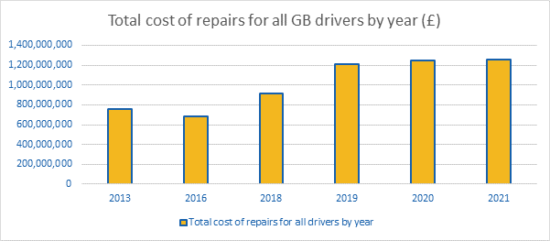Kwik-Fit report shows cost of pothole damage rises despite huge drop in mileage

New research released today (31 March) reveals that the impact of the pandemic has resulted in the average driver reducing their mileage by 42 per cent over the last year. However, there has not been an equivalent drop in the amount of pothole damage to the nation’s vehicles.
In fact, this year’s PIT Report (Pothole Impact Tracker) for Kwik Fit reveals that the total cost to British drivers from pothole damage over the last twelve months rose slightly compared to the year before, reaching £1.267 billion compared to £1.249bn for the year to March 2020.
Kwik Fit’s PIT Report tracks the impact of potholes on an annual basis and its research shows that this year, despite drastically reduced mileage, drivers have hit an average of 11 potholes per month, and some 10.2 million have suffered damage to their car as a result. As tyres are a car’s first line of defence against potholes, they are the most commonly damaged component, suffered by 4.2 million drivers. This is followed by suspension damage (3.0 million), wheels (2.8m) and steering (2.0m).
The average cost of repairs drivers have faced over the last twelve months has been £127.20, an increase of 11 per cent on the previous year. While slightly fewer drivers have suffered damage than in the previous year, this increase in average cost has resulted in the slight rise in the national repair bill.
Although the average driver has been covering significantly fewer miles over the past twelve months, the worsening condition of UK roads may be a reason why so many are still needing repairs. Nearly half (48 per cent) of all drivers say that the condition of the road surfaces in their local area are worse than twelve months ago, with only 12 per cent saying they are better. (35 per cent say they are about the same.)
Drivers in Scotland are most likely to say their roads are worse than a year ago, while motorists in London are least likely. In the capital a third of drivers 33 per cent say the roads are worse, but nearly as many (27 per cent) say they are better. Interestingly, it is London drivers who are most likely to have complained to their local authority about the potholes in their area. 46 per cent of London motorists have done so, compared to an average of 30 per cent of drivers across the country, which may be a reflection of the fact that London drivers pay an average repair bill of £142.60, compared to the national average figure of £127.20.
Drivers hitting potholes may find that the damage is not immediately apparent. Pothole impacts can often result in slow punctures, damage on the inside wall of the tyre, or cracks in the wheel which are not obvious straight away. Any driver who hits a pothole with significant force should monitor their car carefully in the days following the incident, to ensure that their vehicle has remained unscathed.
Roger Griggs, communications director at Kwik Fit, says: “We are all very aware of the massive shock there has been to the public finances as a result of the pandemic. However, the condition of our roads is a long term issue as shown by our PIT report over recent years. Potholes are not just an issue because of the cost to drivers, they present a risk to people’s safety. We need to ensure that any funds made available are used strategically and effectively and not just for short term patching up of the worst affected areas.”
Any driver who has hit a pothole and suspects they may have suffered damage but are unsure what to look for can take their car to any of Kwik Fit’s 600 plus centres across the UK where the company’s expert technicians will check for damage.

 Dunlop
Dunlop Copernicus Sentinel; Pierre Markuse; CC-BY-2.0
Copernicus Sentinel; Pierre Markuse; CC-BY-2.0
Comments